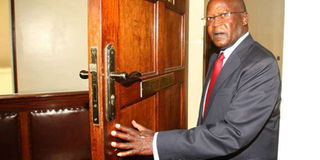Why did State House dilly dally on tribunal?

Justice Philip Tunoi at the Supreme Court of Kenya in Nairobi on February 1, 2016 for the special hearing by the Judicial Service Commission. The handling of the Tunoi saga does not communicate that citizens should trust the government. PHOTO | EVANS HABIL | NATION MEDIA GROUP
What you need to know:
- The handling of the Justice Philip Tunoi saga almost degenerated into a controversy of its own when State House announced that a certain document was missing from the dossier presented to the President by the Judicial Service Commission (JSC).
- There was some consternation when, later, the story changed with Head of the Public Service Joseph Kinyua writing a letter which purported to be a response to the JSC’s request that the President appoint a tribunal to investigate Justice Tunoi.
- The following day, however, the President reversed his decision, and appointed a tribunal headed by veteran lawyer, Sharad Rao.
- There has been speculation that the reluctance has to do with the fear that in this season of sensational revelations that have exposed the alleged misdeeds of key Jubilee figures, a trial of Justice Tunoi may provide opportunities for unleashing more revelations, some of which might further embarrass the government.
The handling of the Justice Philip Tunoi saga almost degenerated into a controversy of its own when State House announced that a certain document was missing from the dossier presented to the President by the Judicial Service Commission (JSC).
There was some consternation when, later, the story changed with Head of the Public Service Joseph Kinyua writing a letter which purported to be a response to the JSC’s request that the President appoint a tribunal to investigate Justice Tunoi.
Through Mr Kinyua’s letter, the President declined to make the appointment arguing that a court decision would have to await the resolution of the question as to the proper retirement age of all judges, which Justice Tunoi was disputing.
The following day, however, the President reversed his decision, and appointed a tribunal headed by veteran lawyer, Sharad Rao.
The Supreme Court judge is facing accusations of receiving a Sh200 million bribe from Nairobi Governor Evans Kidero to influence an election petition filed by his challenger Ferdinand Waititu.
The judge and the governor have denied the claims.
The prevarication surrounding the appointment of a tribunal against Justice Tunoi has not gone unnoticed and may be due to one of two reasons.
PRESIDENT'S ADVISORS
First, it is possible that, for reasons that are difficult to discern, a section of the President’s advisors was determined to frustrate the possibility of a tribunal against Justice Tunoi, and so set out to manufacture a series of excuses.
According to this view, when the story about a missing document failed to wash, they latched onto a new excuse, to do with the outstanding dispute regarding Justice Tunoi’s retirement age.
The second possibility is that there is reluctance among the top leadership in Jubilee with the idea of accountability for the complaint against Justice Tunoi.
It may be that the officials who first declined to make the appointment were putting out a hot air balloon, at the behest of the top leadership.
There has been speculation that the reluctance has to do with the fear that in this season of sensational revelations that have exposed the alleged misdeeds of key Jubilee figures, a trial of Justice Tunoi may provide opportunities for unleashing more revelations, some of which might further embarrass the government.
TRUST
Whatever the case, the handling of the Tunoi saga does not communicate that citizens should trust the government.
Rather it suggests that either a section of the presidential team has become too familiar with their boss and was trying to manipulate him into a wrong decision, or that the top leadership has a reserve of doubt as to the need for accountability.
As the tribunal is awaited, Justice Tunoi is also dealing with the separate proceedings in which he has challenged the retirement age of 70 years, claiming that he should be allowed to serve until 74 years, the retirement age under the old Constitution.
This matter is on appeal and its decision may overtake the proceedings of the tribunal.
There has been speculation that the attempt by Mr Kinyua to delay the appointment of the tribunal was based on the hope that if Justice Tunoi lost the appeal, this might provide him with a face-saving exit from the Judiciary.
SHARAD RAO
The tribunal against Justice Tunoi has already attracted some opposition from the legal profession and the political establishment, with claims that Mr Rao, who is over 70 years, is unqualified to serve on it and further that he has also chaired the vetting board for judges and magistrates which previously handled Justice Tunoi’s case.
There have been suggestions Mr Rao could sit as a member rather than chairman.
The view that Justice Tunoi has managed to get away with just about anything during his professional life has been an indirect source of pressure in the decision-making on the matter.
It is not clear when the tribunal will actually be established. It is not unlikely that the establishment will delay the tribunal and first wait to see how the proceedings regarding the retirement age are decided.
There are also questions of transparency if the tribunal gets to sit.
CONFIDENTIAL HEARING
The Constitution allows Justice Tunoi to elect between an open and a confidential hearing.
It is not clear what he would choose if the tribunal gets round to sitting.
Justice Joseph Mutava, who has been facing removal proceedings, chose a closed hearing which has removed his matter from the purview of the public.
It is unclear where the matter stands.
Given the public interest that the complaint against Justice Tunoi has attracted, it can only be hoped that he will choose an open hearing.





